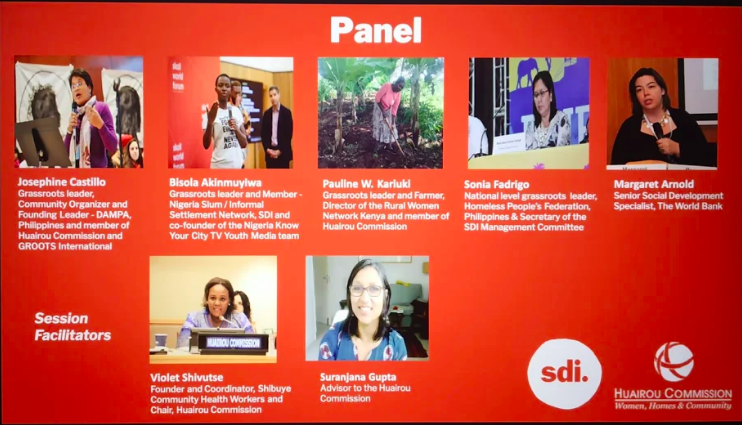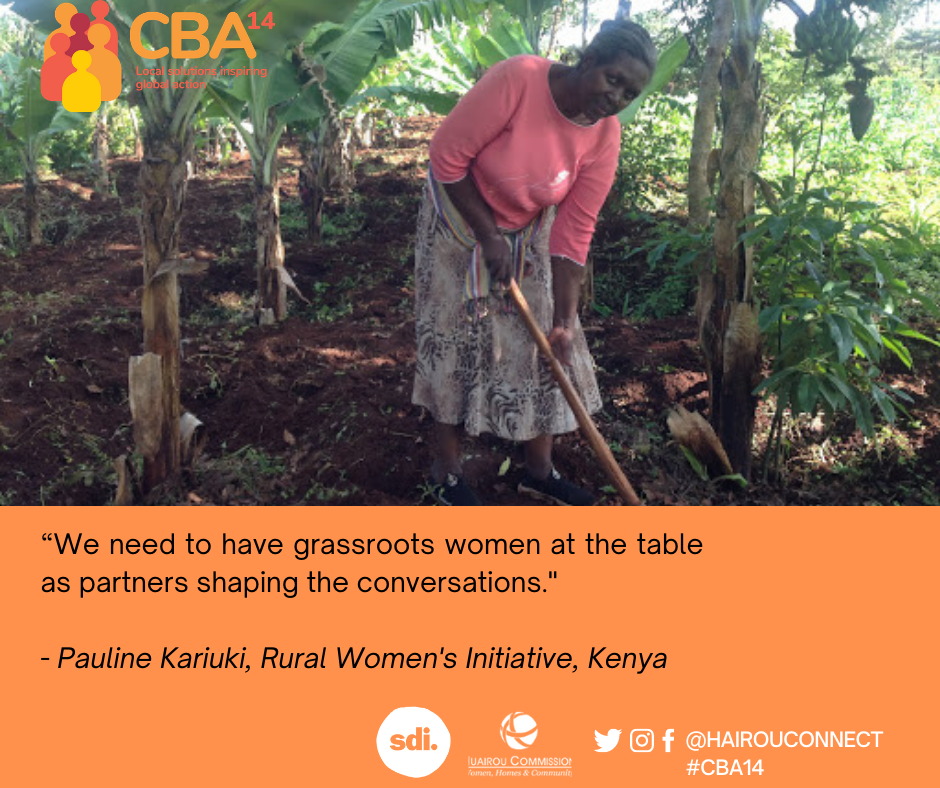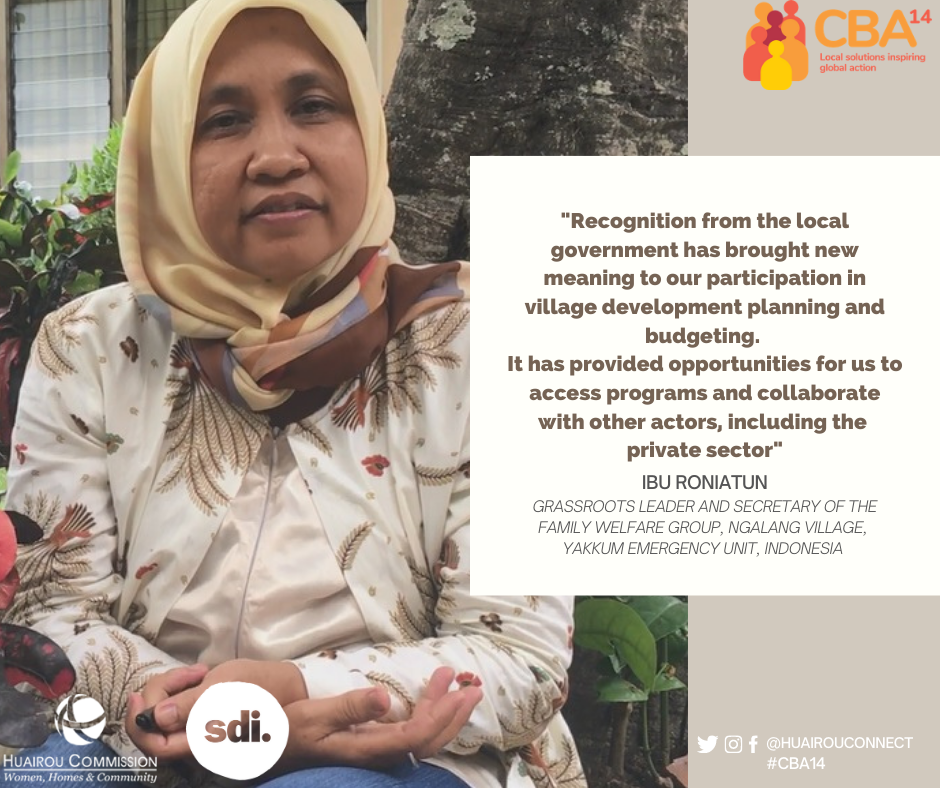Organized grassroots groups share their evidence-based recommendations for enhanced Climate Action

For more ambitious and accelerated climate action and resilience focused development, it is essential to invest resources where they are most needed and support those at the forefront of action. Organized grassroots networks offer smart solutions that not only address a wide range of climate risks and build resilient communities, but also enhance their agency in development. However, grassroots actors, especially grassroots women, have been historically marginalized from public planning processes. It remains imperative to include organized grassroots groups in the decision making and resource allocation process to achieve climate action goals.
The argument grounded the 14th Conference on Community Based Adaptation to Climate Change (#CBA14), where the Huairou Commission together with Slum Dwellers International and like-minded partners participated in two sessions designed by and facilitated by the grassroots leaders – “Impacting Policies” and “Listening to Grassroots Voices”. The sessions demonstrated the “power of self-organisation to redress power asymmetries and to build resilience to multiple risks having human agency and dignity at the core,” in the words of Karen Wong from the International Institute for Environment and Development.

The key messages coming from the multi-stakeholder sessions focused on the evidence, knowledge, tools and decision-making relating to enhancing local communities’ long-term resilience.
Multiple risks and grassroots-led strategies to address them
Grassroots leaders highlighted the multiple risks they and their communities face due to climate change and related disasters. The risks faced by women intensify due to their disadvantaged position in the communities as a result of ingrained structural inequalities and cultural norms. But grassroots women are constantly developing strategies and devising smart solutions that address multiple vulnerabilities as well as empower them.
Grassroots role in climate resilience – a basket of contributions
Grassroots bring in their knowledge, labour, skills, tools and collective resources alongside valuable information on the issues facing their communities to offer smart solutions that cause multilevel and multi structural transformations and hence their role in climate change adaptation and planning is of extreme importance.
Claiming land – an important asset for resilience building
Land as a critical asset, empowers grassroots women to have access, control and use for resilient practices that increase theirs and their communities’ capacity to withstand multiple climate shocks and stresses. Land ownership is key to ensure long-term sustainability, food and tenure security and generate income.
“When we did mapping and women’s land rights was revealed as a big issue, we could begin doing work plans with the government and explore other options for women to access land rights. We have seen this has led to an improvement in food security for families”
~Violet Shivutse, Founder – Shibuye Community Health Workers, Kenya, Chair of the Governing Council, Huairou Commission
Organized and empowered communities for building trust and partnership
Grassroots communities do not work in isolation. They involve the local stakeholders, mainly the local government in resilience building activities. Building grassroots-government partnership is a long and two-way process, but organised and empowered grassroots groups use various tools to demonstrate results of their resilient practices to their local authorities and become credible partners that supports their access to government programs and increases their involvement in local and national planning processes.
Grassroots-led movements influence policies
Grassroots establish networks to advocate for issues affecting their communities and leverage formal resources from partners such as the local government, to scale their solutions, for which solid ground works have already been put in place by them.

How can multilateral organisations support locally-led actions?
Partners, who have worked with grassroots networks and their movements shared insights on what they and other development institutions can do to strengthen support for local climate actions. Margaret Arnold, World Bank,called upon the international NGOs and multilateral agencies to use their “convening power” to open doors for grassroots leaders when designing projects and engaging grassroots organisations as consultants – documenting their own practices and integrating their learning into design of programs. In turn, Arghya Sinha Roy, Asian Development Bank, building on the Huairou Commission’s partnership with ADB that supports innovative community resilience initiative,stressed the role of multilateral organisations in creating an enabling environment for grassroots action to advance resilience building. He noted that the tacit grassroots leaders’ knowledge on climate impacts at the community level is crucial to improve the quality of climate finance, ensuring investments flow in the right direction and remain flexible. Meanwhile, Dinky Soliman, former Secretary of Government of Philippines and present Lead at the INCITEGov, highlighted the role of community driven development in informing good policy and how effective it is for the government to look into this kind of work.
Grassroots stories of resilience and the key messages affirm three things:
- grassroots communities are most affected by climate change, yet they are constantly innovating solutions to address multiple risks;
- grassroots possess knowledge, capacity, skills and resources to deliver smart solutions to these challenges and enhance community resilient development through trust building partnership with their local government;
- in the wake of the rising climate change crisis, it is therefore important to perceive grassroots as equal, trusted partners in development, engage them in adaptation planning and decision making and invest in their locally-led initiatives to accelerate global climate action.
The links to the session recordings can be accessed here:
1. Listening to Grassroots Voices – Sep 22, 2020
2. Impacting Policies – Sep 23, 2020
